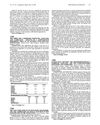 8 citations,
July 2020 in “International Journal of Pharmaceutics”
8 citations,
July 2020 in “International Journal of Pharmaceutics” Finasteride's solubility improves with native y-CDs, enhancing hair loss treatment and reducing side effects.
 8 citations,
March 2020 in “Metabolites”
8 citations,
March 2020 in “Metabolites” Finasteride treatment changes urine metabolomics and steroid signatures, potentially monitoring effectiveness but may cause sexual side effects.
 8 citations,
March 2020 in “Aesthetic Plastic Surgery”
8 citations,
March 2020 in “Aesthetic Plastic Surgery” Finasteride and minoxidil together safely and effectively increase hair growth and density for androgenetic alopecia.
 8 citations,
July 2019 in “Endocrine connections”
8 citations,
July 2019 in “Endocrine connections” Finasteride affects SRD5A2 gene pattern, possibly causing lasting side effects.
8 citations,
January 2019 in “Clinical research and trials” Finasteride is effective and safe for long-term treatment of hair loss in Japanese men.
 8 citations,
July 2018 in “Current Sexual Health Reports”
8 citations,
July 2018 in “Current Sexual Health Reports” Finasteride can cause lasting sexual dysfunction, depression, and other side effects, needing more research for treatment.
 8 citations,
January 2018 in “PubMed”
8 citations,
January 2018 in “PubMed” Smaller finasteride particles increase effectiveness in treating hair loss.
 8 citations,
December 2017 in “Cancer Medicine”
8 citations,
December 2017 in “Cancer Medicine” Finasteride use may increase the risk of male breast cancer.
 8 citations,
July 2017 in “The Journal of Steroid Biochemistry and Molecular Biology”
8 citations,
July 2017 in “The Journal of Steroid Biochemistry and Molecular Biology” DHT affects testicular development and regulates spermatogenesis in some fish.
 8 citations,
February 2017 in “Clinical Drug Investigation”
8 citations,
February 2017 in “Clinical Drug Investigation” Finasteride can cause sexual dysfunction and depression, which may persist and require hormonal treatment.
 8 citations,
December 2016 in “Revista Medica De Chile”
8 citations,
December 2016 in “Revista Medica De Chile” Finasteride can cause sexual dysfunction, sperm changes, and affect bone density and metabolism.
8 citations,
June 2016 in “PubMed” Finasteride is effective and safe for treating hidradenitis suppurativa in both adults and some younger patients.
8 citations,
January 2016 in “Indian Journal of Pharmacology” Finasteride and dutasteride can cause severe, lasting side effects.
 8 citations,
July 2014 in “General and Comparative Endocrinology”
8 citations,
July 2014 in “General and Comparative Endocrinology” Finasteride affects frog testes by increasing testosterone, decreasing 5α-DHT, and impacting genes related to reproduction and other functions.
 8 citations,
December 2011 in “Journal of Medicinal Food”
8 citations,
December 2011 in “Journal of Medicinal Food” D-004 may be a natural alternative to finasteride for treating enlarged prostate and male baldness.
 8 citations,
August 2011 in “Journal of Pharmacology and Experimental Therapeutics”
8 citations,
August 2011 in “Journal of Pharmacology and Experimental Therapeutics” Dosing time affects finasteride's effectiveness and safety in rats.
 8 citations,
January 2009 in “Indian Journal of Dermatology, Venereology and Leprology”
8 citations,
January 2009 in “Indian Journal of Dermatology, Venereology and Leprology” Finasteride can cause rare breast growth side effect, with varying recovery after stopping.
 8 citations,
December 2008 in “Journal of The American Academy of Dermatology”
8 citations,
December 2008 in “Journal of The American Academy of Dermatology” Finasteride can cause a unique skin reaction on the penile shaft.
 8 citations,
April 2004 in “The Journal of Urology”
8 citations,
April 2004 in “The Journal of Urology” Doxazosin and finasteride negatively affect sexual function in men with BPH.
 8 citations,
October 1998 in “Comparative Biochemistry and Physiology Part C: Pharmacology, Toxicology and Endocrinology”
8 citations,
October 1998 in “Comparative Biochemistry and Physiology Part C: Pharmacology, Toxicology and Endocrinology” Proscar (finasteride) blocks 5α-reductase in sea urchin ovaries and testes, suggesting potential treatment for androgen-related conditions.
8 citations,
January 1998 in “PubMed”  8 citations,
January 1991 in “European Urology”
8 citations,
January 1991 in “European Urology” Finasteride lowers DHT levels and raises testosterone in a dose-dependent way.
7 citations,
April 2021 in “Journal of Clinical Psychopharmacology” Finasteride may increase the risk of depression, anxiety, and suicidal thoughts.
 7 citations,
June 2020 in “Translational Andrology and Urology”
7 citations,
June 2020 in “Translational Andrology and Urology” Finasteride for hair loss may cause lasting sexual, genitourinary, mental, and anti-androgenic side effects in young men.
 7 citations,
July 2019 in “Scientific Reports”
7 citations,
July 2019 in “Scientific Reports” Finasteride helps reduce heart enlargement in heart failure patients.
 7 citations,
March 2019 in “Cancer Epidemiology, Biomarkers & Prevention”
7 citations,
March 2019 in “Cancer Epidemiology, Biomarkers & Prevention” Finasteride use is not clearly linked to an increased risk of male breast cancer.
 7 citations,
January 2019 in “The Aging Male”
7 citations,
January 2019 in “The Aging Male” Post-finasteride syndrome's existence is uncertain; more research needed.
 7 citations,
March 2018 in “Dermatology and therapy”
7 citations,
March 2018 in “Dermatology and therapy” Finasteride is considered the best treatment for hair loss, despite side effects.
 7 citations,
January 2018 in “International Journal of Trichology”
7 citations,
January 2018 in “International Journal of Trichology” Taking 5 mg/day finasteride can cause side effects in women with hair loss, but these are usually mild and fade over time, making the treatment beneficial in the long run.
 7 citations,
October 2017 in “Artificial Cells Nanomedicine and Biotechnology”
7 citations,
October 2017 in “Artificial Cells Nanomedicine and Biotechnology” Finasteride-loaded ethosomes improve hair loss treatment by targeting pilosebaceous unit.

























